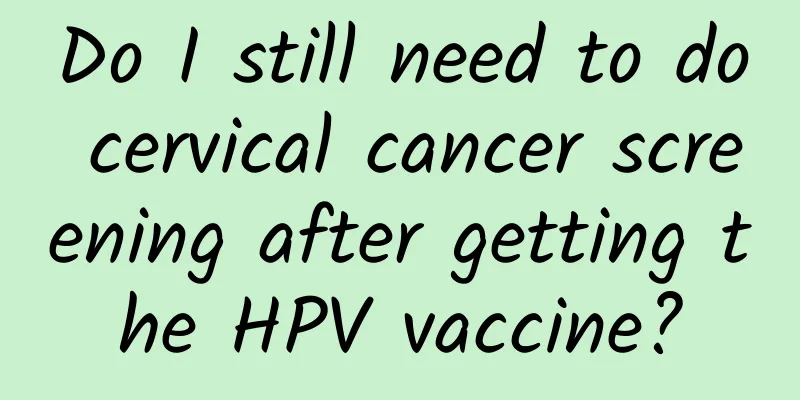Do I still need to do cervical cancer screening after getting the HPV vaccine?

|
Recently, the National Health Commission pointed out that it will focus on promoting regions with mature conditions to take the lead in introducing free HPV vaccination policies and continuously increase the HPV vaccination rate for girls of appropriate age. In May 2021, the National Health Commission launched the "Healthy City Construction to Promote the Healthy China Action Innovation Model" pilot project in 15 cities across the country to explore comprehensive prevention and treatment strategies for cervical cancer. Cervical cancer is the only malignant tumor with a clear etiology, namely persistent infection with high-risk human papillomavirus (HPV). But is HPV vaccination enough to cure all problems? Is it still necessary to do cervical cancer screening after HPV vaccination? After HPV vaccination Do I still need to do cervical cancer screening? HPV vaccination is critical as primary prevention, but cervical cancer screening should not be ignored. Copyright image, no permission to reprint Regardless of whether you receive a bivalent, quadrivalent, or nine-valent vaccine, you still need to undergo regular screening after vaccination. Existing vaccines cannot prevent all high-risk HPV types, and there may be a small number of high-risk HPV types that have not yet been identified and for which there is no targeted vaccine. Got the HPV vaccine Will I not get cervical cancer? no. HPV is scientifically known as human papillomavirus, a virus that is ubiquitous in nature. The total infection rate in a person's lifetime exceeds 50%, but the chance of developing cervical cancer is less than 5%. It is now clear that the vast majority of cervical cancers (95%) are caused by infection with human papillomavirus (HPV). HPV is a large family with more than 200 subtypes, divided into high-risk and low-risk types, of which 14 are clearly related to the onset of cervical cancer. Persistent infection with HPV16 and HPV18 accounts for 70% of cervical cancer patients. Copyright image, no permission to reprint The domestic two-valent cervical cancer vaccine can prevent high-risk HPV types 16 and 18, the four-valent vaccine can prevent types 6, 11, 16, and 18, and the nine-valent vaccine has a wider coverage, but does not cover all types. Therefore, even if the chance of infection is not high, there is still a possibility of causing cervical cancer. Is it necessary to do cervical cancer screening every year? It is recommended that cervical cancer screening for women begin after they become sexually active, and some guidelines recommend starting after the age of 21. It is recommended to do a cervical HPV virus test combined with a cervical liquid-based cytology test, and screen at least until the age of 65. The screening interval has different requirements in different hospitals. It can be screened once every three years or once a year. Annual screening can reduce the missed diagnosis rate and improve the diagnosis rate. Does an abnormal screening result mean that I have cervical cancer? The development of cervical cancer from HPV infection is generally a slow process, often taking several years, which provides the body with ample time to fight it. A healthy human body has a good immune function, and 50% to 90% of HPV infections can be cleared by the body within a few months or 2 years (about 1 year on average) and will not develop further. However, if the same high-risk HPV is detected twice in a row with an interval of one year, it is called persistent HPV infection, which requires increased attention and prompt hospitalization for further examination. It takes a long time for HPV infection to turn into cervical cancer. The key is to do regular cervical cancer screening, follow the doctor's instructions and treat it rationally, and do both HPV vaccination and cervical cancer screening. In daily life, you should pay attention to maintaining a good mood, combining work and rest, and exercising appropriately to improve your body's resistance. Source: CNR This article has been authorized. Please contact the original author for reprinting. The cover image and the images in this article are from the copyright gallery. The image content is not authorized for reprinting. |
<<: Seeing the "anonychia" hand reminded me of Voldemort's nose...
>>: Iodine deficiency is a big deal! Please pay attention now
Recommend
Sweating on the soles of women's feet is dampness
I believe that everyone must be familiar with the...
What are the benefits of drinking white tea for women? Why does drinking white tea cause internal heat?
White tea contains a lot of vitamins and amino ac...
National Ear Care Day | Hyperbaric oxygen therapy for sudden deafness
Sudden deafness, or "sudden deafness" f...
What is vaginal reduction surgery for women like?
Vaginal relaxation in women usually occurs after ...
Female has dull pain under left rib
We should pay attention to the phenomenon of dull...
Stomach pain during early pregnancy
Women will experience many physical discomforts a...
Can I eat cucumbers during confinement?
Some dietary taboos during the confinement period...
Can pregnant women eat food heated in a microwave?
The fast-paced life leaves everyone with less tim...
Heavy menstrual flow with blood clots after IUD insertion
What is the reason for heavy menstrual flow and b...
How to supplement luteal deficiency with food, nine methods to teach you
Corpus luteum insufficiency is generally caused b...
What foods are good for the ovaries?
For women, the ovaries are very important reprodu...
What foods are good for ovarian maintenance?
The ovaries are very important reproductive organ...
How to expel waste from the uterus?
There must be a lot of people who don’t know that...
What to do if you have a hunchback after giving birth
Tall girls are much more likely to have a hunchba...
What is the reason for the green discharge?
I believe that female friends usually pay attenti...









